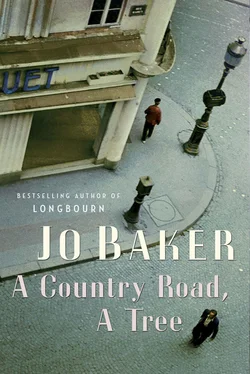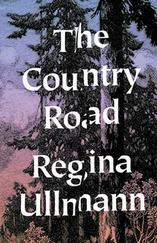The voices are closer now. Individual interactions: the demand, the moment’s pause with fumbling, the proffering of papers; a silent scrutiny, then questions. To what purpose are you travelling? Where have you come from? What is your ultimate destination? Whom exactly are you intending to meet? But their papers are good. They are supposed to be good. The papers will stand up to scrutiny. Won’t they?
“We have to—”
She nods. She’s on her feet, hefting her bag.
They thread their way out of the compartment and along the corridor. They pass the woman. Back of a grey head, a maroon felt hat. She is talking about a bicycle now: her son worked for months washing pots in the café in town to save up for it; he would go out riding in the country lanes, his head skimming along higher than the hedges.
He glances back and sees the woman’s mouth moving, the tears streaming down her cheeks; a bubble swells at her nostril. He had not known, had not realized that the thickness of her voice was tears. It pushes after him, even as they heave the train door open and dip down for a toehold. The boy had had a puncture, too bad to mend there on the spot, had to push his bike back to the garage. Back after dark, and worried sick, she was.
He drops down on to the gravel, drags his bag after him. Suzanne reaches out a hand and he helps her down. There’s a smell of oil and dust and urine. He pushes the door to after them.
“Someone might say.”
“Yes.”
He jerks his head: come on. They dash across the tracks, then scramble up the bank and in amongst the trees. Brambles tear at clothes and skin. He blunders through a clump of nettles. He swears under his breath, carries on.
They reach the top of the bank breathless. The air is cool; it’s twilight. There’s a fence — he, long-legged, swings across, and helps her clamber up and over and down the other side. A lone horse ambles across, snuffing at them.
The field is bare and scrubby and exposed. They turn and scud along the field edge, keeping to the shadow of the trees; the horse trots alongside them. There’s a gate but it is tied shut and the knot doesn’t give so they climb the bars, and then they’re in a lane, the horse left behind. The lane is hedged at first, and then there are fences and then buildings and the way narrows between high walls; there’s a smell of tar and the sound of their clattering footfalls and their rasping breath. Something stops and stares, its eyes reflecting red; then a blink and it’s gone. Their hands, linked tight, are hot and damp together; they can only go single-file now between brick walls, he doesn’t know when they joined hands. His arm is stretched back to her; she’s tumbling forward to hold on to him. It’s uncomfortable, constraining, it might be better to let go. They don’t let go. His chest hurts; the scar pulls and he can’t catch his breath.
At an intersection between alleyways they stop in unspoken accord; she bends double, gasping, a hand to her side. He leans against a damp wall, his belly heaving. There’s a little light left. It’s grainy and crumbling.
“Are you all right?”
She says, “I’m all right.” Then, after a moment, “What about you?”
He nods. He’ll live. Though his eyes swim with stars.
“Does your chest hurt?”
“Does it hurt?” He laughs, but the laugh collapses into a coughing fit. When he can speak again, he just says, “Yes.”
He fishes out his cigarettes, lights up, takes a drag, then turns the cigarette around and proffers it. She takes it off him, smokes. Perhaps she has forgiven him.
“What will we do now?” she asks.
“Keep on. Make that rendezvous.”
“On foot.”
“Well, yes.”
“Oh, the cow.”
“You don’t want to walk?”
“I’m fatigued, you know I am. You are too. We were tired before we started this.”
“You could have stayed on the train if you wanted to. You should have said.”
She narrows her eyes at him. She takes another drag on the cigarette. Then: “So which way is it, genius?”
He looks up at the thin strip of sky overhead; it’s a deep evening blue.
“We could tell by the sun,” he says. “On the train, it was going down on the right.”
“But that was on the train.”
“Yes.”
“And now we’re in an alleyway.”
“Yes,” he says.
“And we can’t see the sun. And we’re all turned around. So.”
“What then, toss a coin?” He fumbles in a pocket.
“What good would that do?”
He shrugs, takes the cigarette off her. “It’d be something. It’d be a start.”
“Hardly.”
“So we’ll just stay here, then.” He takes a drag and settles down against the wall.
“Shut up,” she says. “Idiot. You break my feet, you know.”
He shuffles his shoulders, chilly brick against his back. “You know, I like this alleyway. I think we could be happy here.”
“Oh, I’ve had enough. Come on !” She grabs his arm.
He heaves himself off the wall and stumbles after her, his breath sore in his chest: cross-country runs, bare corn-beef legs, the rawness of autumn in Enniskillen.
They emerge into an open space, a woodyard, smelling of sawn timber. A crow flaps overhead and makes them jump. They cross the yard and slip past a boom-barrier on to a wider gravel track, past a parked wagon and a strip of wasteland, past factory gates, and then on to a metalled road; this is becoming the outskirts of the town. He walks beside her then, his breath easing. Softening to her, he catches her hand. He doesn’t glance round at her, but even so he knows that she has pulled a face.
—
The woman lies on the cobbles, her head resting on a curved arm. Her coat is open on a thin blouse and her skirt riding up to expose her stocking-tops. Suzanne crouches to twitch the fabric down. She gets back up and her cheeks are flushed. She slips her arm under his and clings close. Her breath comes in misty billows.
“Her eyes are frozen,” she whispers.
“What?”
“The wet of her eyes is frozen.”
A man is lying flat on his back. They pass him, their footfalls echoing in the evening square. A cat slinks away at their approach. They can see the dark wound in the man’s cheek: a hole where there should be skin and muscle. The side teeth are bared in a snarl, a bit of bone glows white and the tongue slumps heavily sideways, hanging out. It’s all just there, just open to the world: the quiet internal spaces.
Outside the Mairie, the police are at work. They are rifling pockets, making notes on clipboards; they are lining up the bodies and laying them in the back of a truck. Soon everything — everybody — will be processed and cleared away; it will be as though nothing ever happened here.
He doesn’t want to look. He has to look. This has to be looked at, square in the face, right in the hole in the face — the policemen with their breath fogging the evening, the corpses with the air clear and unclouded above them. Words fail him now; they keep on failing; he is as speechless as a corpse himself.
He squeezes Suzanne’s arm tight into his side; her chin is crumpled and her gaze fixed. Dry-eyed, they slip into the bus station; it is cold and it is busy. They find a bench. His skin feels oily with disgust. “Excuse me.” He leaves her sitting there and strides off to the gentlemen’s lavatory. There, hunched over a filthy toilet à la turque, he heaves up nothing, then some bitter yellow bile. He is left shaking. He feels no better for it.
He goes back to Suzanne, tilts his head at her enquiring look. He is fine. Girls, women, men in working blues gather at the stands. They stand stiff and shivering, coats buttoned up, collars turned, with their baskets, cases, packages; the buses swing in and doors are clanked open, and the people shuffle themselves on board and the buses heave away. Two German soldiers cross the forecourt and leave a wake of silence. There is something vulnerable about their exposed ears, their shaven napes. They take up a position near the rear wall. It makes the back of the neck burn, the desire to look round, the necessity of not doing so.
Читать дальше










